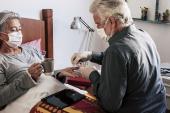Retracted Over Fraud Concerns, Surgisphere ACE/ARB Study Still Gets Cited
The study's data couldn’t be verified, prompting the retraction, but it still gets regular citations in the medical literature.

A high-profile study that purported to provide the first reassurances ACE inhibitors and ARBs could be safely used in the setting of COVID-19 continues to be cited long after it was retracted over concerns of scientific fraud, a new analysis shows.
In fact, more than half of the study’s citations occurred after it had been retracted for 3 months or longer, with 21 occurring in May 2021 alone, nearly a full year after the study was pulled from the medical literature.
Senior investigator Emily McDonald, MD (McGill University Health Center, Montreal, Canada), said their group was “amazed” the retracted study—which raised fraud concerns when Surgisphere refused to surrender its data for verification—had such far-reaching implications. “Over time, we kept track of it, and the citation numbers for the paper kept going up and up and up and we were floored by this,” she told TCTMD.
The original study of ACE inhibitors and ARBs in COVID-19 garnered a lot of attention because there were concerns that inhibitors of the renin-angiotensin-aldosterone system (RAAS) might make people more susceptible to contracting COVID-19 or developing a worse form of illness if they were infected. SARS-CoV-2, the virus responsible for COVID-19, binds to the ACE2 receptor to gain entry into host cells, and both ACE inhibitors and ARBs are known to upregulate ACE2 expression.
In a May 2020 study published in the New England Journal of Medicine, lead researcher Mandeep Mehra, MD (Brigham and Women’s Hospital, Boston, MA), and colleagues reported that the presence of cardiovascular disease, as opposed to RAAS inhibitors or other cardiovascular medications, was responsible for the increased risk of death in hospitalized COVID-19 patients.
Instead of providing reassurances, however, the scientific community immediately questioned the reliability of the data in the NEJM paper as well as one published in the Lancet regarding hydroxychloroquine. Specifically, there were concerns over how Surgisphere, the Illinois-based company that owned the data used in the study, could have amassed such a large collection of details on COVID-19 patients in such a short period of time.
Following calls to release the raw data so that independent auditors could validate the results, Sapan Desai, MD, the founder of Surgisphere and co-author on both papers, refused to cooperate, which led the authors of both the NEJM and Lancet papers to retract their studies.
Lots of Interest in the Papers, Even Today
In the new analysis, which was published August 3, 2021, in JAMA Internal Medicine and focuses solely on the ARB/ACE inhibitor analysis, McDonald and colleagues found the retracted study had been cited 934 times. Excluding preprints and duplicates, among other reasons, the researchers verified a citation in 652 articles. More than 42% of these citations were part of a review article, 34.1% were part of original research, and 17.9% were included in an editorial.
We kept track of it, and the citation numbers for the paper kept going up and up and up and we were floored by this. Emily McDonald
Overall, 10.7% of articles cited the Surgisphere study prior to its retraction, while 34.8% cited the data in the first 2 months after it was retracted. Another 27.8% of citations occurred 6 or more months after it was pulled from the NEJM. Of the 652 verified citations, just 115 papers cited or noted that the Surgisphere study had been retracted.
In terms of context, McDonald said the impact factor of a journal reflects the average number of citations a study published in that journal might expect in a year. The NEJM and the Lancet are both high-impact journals, with the impact factor of the latter being 75.
“So that kind of puts it into context,” said McDonald. “More than 650 citations is massive for any paper.”
In addition to the number of citations, McDonald noted that most were used to support a statement in the article. Most concerning, however, was that data from the retracted paper were incorporated into new analyses. She noted that there isn’t a system-wide solution to the problem of citing retracted studies. While some citation software might catch it, others won’t. The researchers urge authors, peer reviewers, journal editors, and academic centers to take a close look at papers to make sure retracted research isn’t cited in new work.
Perhaps ironically, a number of studies published since the retraction (for example, here, here, and here) have demonstrated what the fraudulent Surgisphere study purported to show—ACE inhibitors and ARBs can safely be continued in patients with COVID-19. Several studies have also shown that COVID-19 prognosis is not worsened among patients with an indication for RAAS inhibition. A wide range of US, European, and international professional societies recommend patients continue to take the drugs as prescribed.
When the Surgisphere studies came out, McDonald and Todd Lee, MD (McGill University Health Center), were the lead Canadian investigators on a study testing whether hydroxychloroquine could prevent COVID-19 in people exposed to SARS-CoV-2. The publications had profound implications for their own research, first and foremost whether they should continue with their trial. As things evolved, it became more apparent that the data were fraudulent, she said, noting that they signed letters of concern asking the journals to look into the research.
Even a year after both papers came out, they are still getting a lot of attention, she noted. The Google scholar citation index of the authors involved in these studies continues to be positively influenced even though both papers are no longer trustworthy.
“There [has been] no way to remove the positive impact that the number of citations the papers received for the authors, which is kind of incredible,” she said.
Michael O’Riordan is the Managing Editor for TCTMD. He completed his undergraduate degrees at Queen’s University in Kingston, ON, and…
Read Full BioSources
Lee TC, Senecal J, Hsu JM, McDonald EG. Ongoing citations of a retracted study involving cardiovascular disease, drug therapy, and mortality in COVID-19. JAMA Intern Med. 2021;Epub ahead of print.
Disclosures
- The authors report no relevant conflicts of interest.





Comments